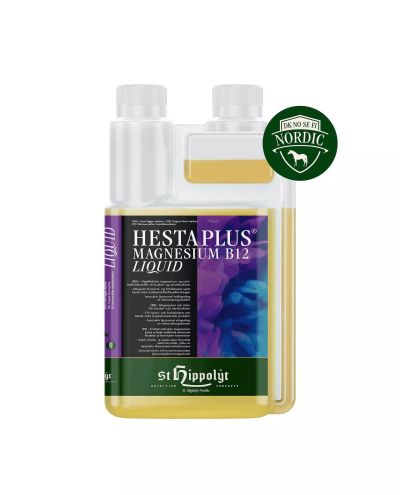HestaPlus Magnesium B12 Liquid 1ltr
-
Liposomal encapsulation improves bioavailability The St. Hippolyt® LIQUIDs series provides essential trace elements and other nutrients encapsulated in liposomes, which enhances their protected transport to their destination in the body. Nanodispersion is used to produce a liquid product, a nanoemulsion, with stable liposomes in which the nutrients are encapsulated. This pretreatment increases the effectiveness of each micronutrient, as both its bioavailability and absorption rate are thus multiplied. Magnesium deficiency can cause -muscle-related and nervous problems - heart and blood circulation disorders - skeletal weakening -decreased mental and physical condition - muscle tension and reduced motivation -tendency to nervousness and weak reaction ability -exhaustion Determining nutrient deficiencies A veterinarian can determine nutrient deficiencies with a blood test. Certain deficiencies can be determined by hair analysis, some by just brushing eyes. Nutrient deficiencies manifest themselves in the early stages in the following ways: - fur and skin changes -changes in the structure of the hooves - muscle tension -reduced pleasure of movement -mood changes -challenges of the digestive tract A lack of one or more nutrients can disrupt and delay a horse's recovery. Typical nutritional challenges: - insect bites and stings -delayed recovery after injuries -fertility -hooves -muscles, including acid formation during work performance - digestion -skin and fur -metabolism In addition to structural tasks, minerals and essential trace elements are needed for the functioning of the enzyme system. Disturbances in the functioning of enzymes lead to metabolic challenges, which can manifest as very different symptoms depending on the individual. Nutrient deficiencies worsen gradually and often go undetected for a long time. Long-term nutrient deficiencies can cause challenging conditions. Feeding The duration of use depends on the nutrient and its deficiency. Although it takes months to years to compensate for a zinc deficiency, for example, a selenium deficiency can usually be treated in a few weeks. Horses suffering from trace element deficiencies should be fed with feed especially rich in trace elements, such as Hesta Mix®, Struktur-E® or NaturMüsli SENIOR.
Dosage:
Approx. 5 ml per 100 kg of live weight daily in connection with normal feeding or optimally approx. 30-60 min. before performance (practice, start of competition, etc.) directly in the mouth with a big splash. NOTE: If necessary, the dose can be temporarily doubled.
PRODUCT INFORMATION Crude protein 0.3% Crude fat 4.2% Crude fiber 0.1% Ash 0.2% Magnesium 1.6% Tryptophan 0.3% NUTRITIONAL-PHYSIOLOGICAL ADDITIVES / KG Vitamin C 3a300 8,000 mg Vitamin B1 3a821 2,000 mg Vitamin B2 3a825i 4,000 mg Vitamin B6 3a831 2,000 mg Vitamin B12 / Cyanocobalamin 50,000 mcg Niacinamide 3a315 2,500 mg TECHNOLOGICAL ADDITIVES Lecithin 1c322 50,000 mg
Composition:
Magnesium citrate, short-chain fructo-oligosaccharides, plant solution (passion flower, hops)
- Availability In Stock
- Brand St HippoLyt
- Breadcrumbs Home ValikoimaAll Feeds HestaPlus Magnesium B12 Liquid 1ltr
- Category All Feeds
- SKU 51213001
Liposomal encapsulation improves bioavailability The St. Hippolyt® LIQUIDs series provides essential trace elements and other nutrients encapsulated in liposomes, which enhances their protected transport to their destination in the body. Nanodispersion is used to produce a liquid product, a nanoemulsion, with stable liposomes in which the nutrients are encapsulated. This pretreatment increases the effectiveness of each micronutrient, as both its bioavailability and absorption rate are thus multiplied. Magnesium deficiency can cause -muscle-related and nervous problems - heart and blood circulation disorders - skeletal weakening -decreased mental and physical condition - muscle tension and reduced motivation -tendency to nervousness and weak reaction ability -exhaustion Determining nutrient deficiencies A veterinarian can determine nutrient deficiencies with a blood test. Certain deficiencies can be determined by hair analysis, some by just brushing eyes. Nutrient deficiencies manifest themselves in the early stages in the following ways: - fur and skin changes -changes in the structure of the hooves - muscle tension -reduced pleasure of movement -mood changes -challenges of the digestive tract A lack of one or more nutrients can disrupt and delay a horse's recovery. Typical nutritional challenges: - insect bites and stings -delayed recovery after injuries -fertility -hooves -muscles, including acid formation during work performance - digestion -skin and fur -metabolism In addition to structural tasks, minerals and essential trace elements are needed for the functioning of the enzyme system. Disturbances in the functioning of enzymes lead to metabolic challenges, which can manifest as very different symptoms depending on the individual. Nutrient deficiencies worsen gradually and often go undetected for a long time. Long-term nutrient deficiencies can cause challenging conditions. Feeding The duration of use depends on the nutrient and its deficiency. Although it takes months to years to compensate for a zinc deficiency, for example, a selenium deficiency can usually be treated in a few weeks. Horses suffering from trace element deficiencies should be fed with feed especially rich in trace elements, such as Hesta Mix®, Struktur-E® or NaturMüsli SENIOR.
Dosage:
Approx. 5 ml per 100 kg of live weight daily in connection with normal feeding or optimally approx. 30-60 min. before performance (practice, start of competition, etc.) directly in the mouth with a big splash. NOTE: If necessary, the dose can be temporarily doubled.
PRODUCT INFORMATION Crude protein 0.3% Crude fat 4.2% Crude fiber 0.1% Ash 0.2% Magnesium 1.6% Tryptophan 0.3% NUTRITIONAL-PHYSIOLOGICAL ADDITIVES / KG Vitamin C 3a300 8,000 mg Vitamin B1 3a821 2,000 mg Vitamin B2 3a825i 4,000 mg Vitamin B6 3a831 2,000 mg Vitamin B12 / Cyanocobalamin 50,000 mcg Niacinamide 3a315 2,500 mg TECHNOLOGICAL ADDITIVES Lecithin 1c322 50,000 mg
Composition:
Magnesium citrate, short-chain fructo-oligosaccharides, plant solution (passion flower, hops)
- Attribute Health and well-being
Be the first to write a review!
By rating you will be entered into a prize draw for a €50 gift voucher.

